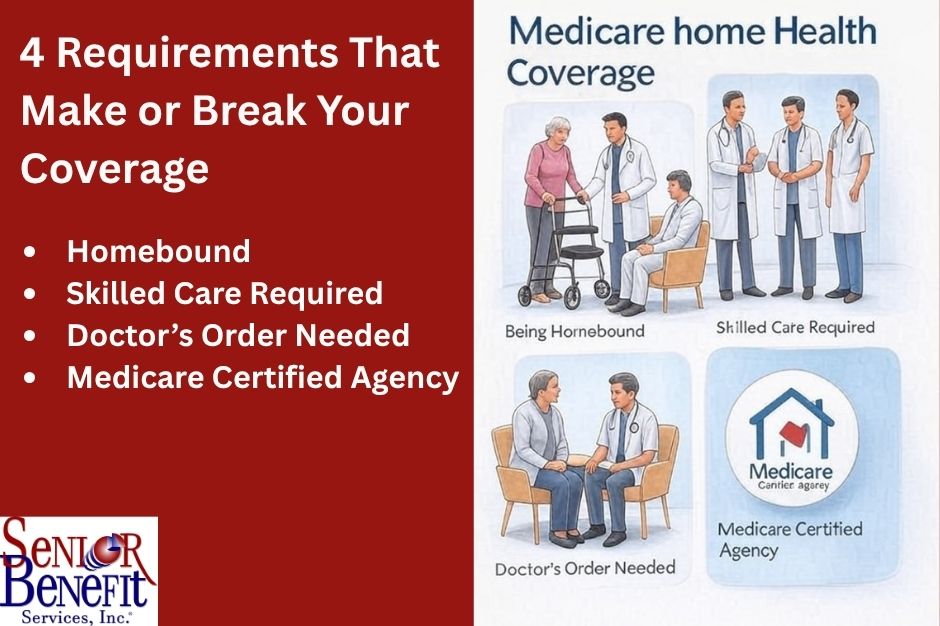What trips up most people about Medicare To Pay For Home Care
Medicare only covers skilled nursing care, therapy services, and medical social services when they’re medically necessary and ordered by your doctor.
They don’t cover someone to help you shower, cook meals, or do laundry unless you’re also getting skilled medical care.
Think of it like ordering a combo meal where you can’t just get the fries. You need the medical “burger” to get the personal care “fries.”
Most people assume Medicare To Pay For Home Care is just for people leaving the hospital. Wrong. You can qualify for Medicare home health services whether or not you’ve been hospitalized, as long as you meet the other requirements.
Hear From one of Our Happy Clients
“I started my search for Medicare with Senior Benefit Services. I knew nothing, and they got me started. I researched all options available to me, from multiple online sources, but in the end, for the same price, I got the personalized assistance of a professional with decades of experience.” – Kenny Bohrer, Maryland Resident
What Medicare Actually Covers for Home Health in Maryland
Medicare covers skilled nursing care for things like wound care, medication management, and monitoring serious health conditions. This isn’t your typical “check on grandma” visit.
We’re talking about medical professionals providing hospital-level care in your living room.
Physical therapy, occupational therapy, and speech therapy are covered when medically necessary.
If you’re recovering from a stroke, hip replacement, or other condition that affects your mobility or daily functioning, these services can be lifesavers.
More Community Resources for Medicare To Pay For Home Care
Medical social services help coordinate your care and connect you with community resources. This often overlooked benefit can be huge for families dealing with complex medical situations.
Home health aide services are covered, but only when you’re also receiving skilled nursing or therapy services. This is where people get confused. You can get help with bathing and personal care, but only as part of a broader medical treatment plan.
Medicare specifically doesn’t cover: custodial care that helps with daily living activities like bathing, dressing, or using the bathroom when this is the only care you need.
The Four Requirements That Make or Break Your Coverage
Getting Medicare home health coverage requires meeting four specific criteria, and missing even one kills your entire claim.
1st Requirement
The very first requirement is you must be homebound. This means you have trouble leaving your home without help like using a cane, wheelchair, walker, crutches, special transportation, or help from another person because of illness or injury.
You can still leave home for medical treatment or short, infrequent absences for non-medical reasons like attending religious services. You can even attend adult day care and still qualify as homebound.
2nd Requirement
Second, your doctor must order the care. A healthcare provider must assess you face to face before certifying that you need home health services. No doctor’s order means no coverage, period.
3rd Requirement
Third, you need skilled care. You must need part-time or intermittent skilled nursing care, physical therapy, or speech therapy services. The care has to require a medical professional, not just someone to help around the house.
4th Requirement
Fourth, you must use a
Medicare-certified agency. A Medicare-certified home health agency must provide the services. Using a non-certified provider means you pay everything out of pocket.
How Much Medicare Pays and for How Long
Medicare home health gets really good: for all covered home health services, you pay nothing.
There’s no limit on the number of visits as long as you continue to meet eligibility requirements and your doctor continues to certify your need for care.
Each certification period lasts up to sixty days, and your doctor can recertify you for additional periods if medically necessary.
The only cost you might face? You pay twenty percent of the Medicare-approved amount for durable medical equipment like wheelchairs or walkers used at home.
Let me put this in perspective. Private nursing visits in Maryland cost significant amounts per hour.
Physical therapy runs substantial costs per session. If you need twice-weekly nursing visits and physical therapy for three months, you’re looking at thousands in costs that Medicare covers completely when you qualify.
Maryland’s Secret Weapon: Dual Coverage Strategy

Maryland residents have access to both Medicare and Medicaid home care programs, and understanding how they work together can save you thousands while keeping you in your home longer.
Medicare focuses on skilled medical services. Medicaid provides coverage for low-income seniors who are also enrolled in Medicare.
When you qualify for both programs (called dual eligibility), Medicaid can pick up services Medicare doesn’t cover. Medicaid covers additional services beyond those provided under Medicare.
How it works in practice: Medicare covers your skilled nursing visits for wound care. Maryland Medicaid might help with personal care services, like help with bathing or meal preparation, that Medicare won’t cover alone.
Services covered by both programs are first paid by Medicare, with Medicaid filling in the difference up to the state’s payment limit.
What if you do not qualify for dual eligibility? If your current household income levels do allow you to qualify for Medicaid benefits, then you should be considering a stand-alone home health care plan.
These plans are more affordable than a traditional long-term care insurance plan and provide benefits to allow you to recover in the comfort of your own home.
It is important to keep in mind that Medicare does not cover your typical custodial home health care services, such as general supervision, homemaker services, or help with activities of daily living, such as eating, bathing, dressing, and mobility.
This is where a stand-alone home health care insurance plan or a long-term care insurance plan will come into play. Want to learn more about home health care expenses, be sure to read our post
here.
Finding Quality Providers in Maryland
Not all home health agencies are created equal, and Medicare only pays for services from certified providers.
Look for agencies with four or five-star ratings and read their detailed quality measures.
Ask about their experience with your specific medical conditions.
Some agencies specialize in wound care, others in cardiac rehabilitation or diabetes management. Make sure they have staff available when you need them and can coordinate effectively with your doctors.
The agency should explain exactly what Medicare will and won’t cover before starting services. Before you start getting your home health care, the home health agency should tell you how much Medicare will pay and tell you both verbally and in writing if Medicare won’t pay for any items or services. Start your search using the Medicare’s
Medicare Compare website to begin your search.
Common Mistakes That Kill Claims
Most Medicare home health denials happen because of easily preventable errors, not because people don’t qualify.
The biggest mistake? Not getting proper physician certification. Your doctor needs to create a detailed plan of care that explains why you need skilled services and why you’re homebound.
Second biggest mistake?
Assuming you don’t qualify because you can still get around sometimes. The homebound requirement allows for occasional outings as long as leaving home requires considerable and taxing effort.
Third mistake? Waiting too long to apply. Start the process as soon as you realize you might need home health services. Getting everything approved and coordinated takes time.
Your Next Steps
When you’re having trouble getting around safely or managing medical care at home, talk to your doctor about Medicare home health services. Don’t wait until you’re in crisis mode.
You might find yourself dealing with a chronic condition that requires ongoing medical management, but ask your physician if home health services might be appropriate for your situation.
Sometimes, you can think you automatically qualify if you have been denied Medicare home health coverage, but don’t assume you don’t qualify. Many denials get overturned on appeal when the paperwork is done correctly
Understanding Medicare home health coverage isn’t just about getting care at home. It’s about maintaining your independence and avoiding unnecessary nursing home placement that could cost you everything you’ve worked to build.








